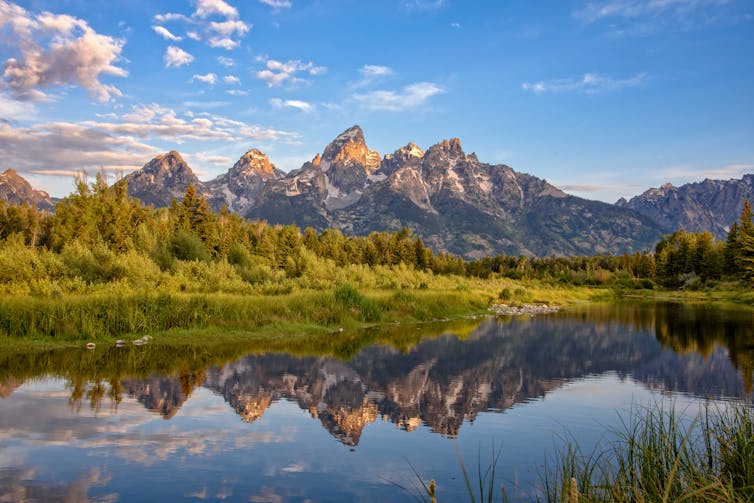Alan Shipman, The Open University
The world’s central bankers won’t be riding into town to save the world this year. Their annual gathering in the US, at Jackson Hole, Wyoming, is taking place online due to COVID-19. But with major economies starting to revive, the pandemic’s impact on the global economy may not even be the biggest of their concerns.
Instead, they are likely to be taking on resurgent inflation, asset and property bubbles, the unfinished repair job from the global financial crisis of 2007-09, and the urgent action needed to halt climate change. This expansive remit underlines how central banks have outgrown their traditionally narrow mission, making public figures of the technocrats who run them.
The most prominent – the Bank of England (founded 1694), the US Federal Reserve (1913) and the European Central Bank (1998) – were set up to watch over the workings of commercial banks and government debt markets. And to use their hold over interest rates to keep inflation close to a target level (typically 2% for higher-income economies). Their power has grown with each financial crisis, an increasingly regular occurrence as the world economy becomes ever more interconnected.
Fiscal attraction
In the 1980s and 1990s, when policymakers believed that controlling the money supply was the key to lower inflation and faster growth, central banks were given greater responsibility for managing the economy. Then, after the financial crisis in 2008, and again after the pandemic in 2020, governments rediscovered the power of fiscal policy, running unprecedented deficits to finance business and household support.
Central banks have played a central role in enabling this rise in public spending while tax revenues are down, by buying up government debt in record amounts through quantitative easing. As a result of these efforts, global long-term interest rates fell to historical lows in 2008 and have continued falling since.
The subsequent claim by one influential economist that central banks are now the “dealers of last resort”, underwriting the markets for public debt, is still controversial. But no one denies the huge growth in central banks’ balance sheets since 2008, as they buy both government debt and also some private debt so that financial systems can absorb vast amounts of new borrowing.
After more than a decade of this extreme monetary relaxation, some see inflationary clouds above Jackson Hole’s famous snowy peak. With annual US inflation now above 5%, the Federal Reserve is under particular pressure to raise interest rates (or signal such an intention) to help curb inflation before it rises so far ahead of wages that the whole government stimulus starts to fall flat.
But even in a luxury ski resort, the Fed is on very thin ice when it considers any rise in interest rates. Efforts to tighten monetary policy in 2013 sparked the infamous so-called “taper tantrum”, which left rich countries’ stock markets teetering, and some emerging economies caught between their exchange rates weakening and their debts becoming more expensive because they were priced in foreign currency.
Now, once again, central bankers from America, Europe and China know that interest rate rises could mean debt-exposed regions – especially in Africa and central Asia – are brought to a shuddering halt for similar reasons.
Point of interest
Some leading economists argue that it will not play out like this. They suggest that the “natural” level of interest rates has fallen and need not return to previous heights. Environmentalists, meanwhile, argue that low interest rates are essential to borrow cheaply to fund massive carbon-reduction investments.
Contrary voices, heard more loudly by those who play the markets, believe a short-term rise is unavoidable. Chronically low interest rates are under fire for exacerbating inequality, as the rich gain more from swollen asset prices than the rest do from higher output and employment.

With such a weight on their shoulders, those logging on to Jackson Hole may be secretly relieved that “modern monetary theory” – which sees nothing inherently unsustainable in governments continually borrowing heavily at low interest rates – now gets a respectful hearing in places that once flatly rejected it. They would never concede that quantitative easing is essentially MMT in action, but the more that these ideas are tolerated, the less their ultra-loose monetary policies come in for criticism.
But at the same time, other economists – including one who correctly called the “death of inflation” 25 years ago – now see a significant risk of its re-emergence.
As COVID-19 spread last year, central bankers demanded a bigger fiscal response to spread the burden of sparking a recovery. Governments duly complied with an expensive round of stimulus packages. Now the pressure is back on the bankers, to keep the money flowing without making everyone pay a higher price.
Alan Shipman, Senior Lecturer in Economics, The Open University
This article is republished from The Conversation under a Creative Commons license. Read the original article.












